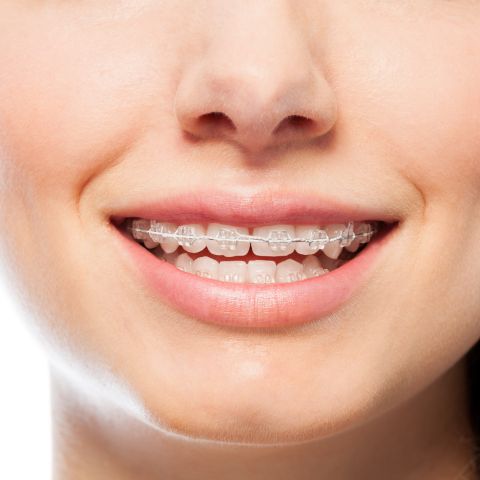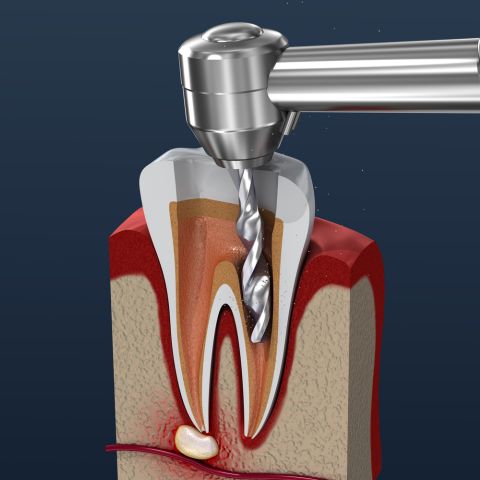

Monolithic Zirconium is a type of dental crown or bridge made entirely from zirconium oxide ceramic, without any layering or porcelain overlay. It stands out for its remarkable strength and durability. Due to its translucent properties, Monolithic Zirconium closely mimics the appearance of natural teeth, making it a preferred choice for both anterior and posterior restorations.
The "monolithic" denotes that the crown or bridge is carved from a single block of zirconium, ensuring that there are no layers that can chip or break away. Its robustness, combined with its aesthetic appeal, makes it a popular choice among dentists and patients seeking long-lasting and natural-looking dental restorations.
Pros of Monolithic Zirconium:
- Durability: Being made entirely of zirconium oxide, monolithic zirconium crowns are highly durable and resistant to chipping or breaking, especially compared to porcelain-fused crowns.
- Natural Appearance: The translucent properties of zirconium allow it to mimic the appearance of natural teeth, ensuring an aesthetically pleasing result.
- Biocompatibility: Zirconium is hypoallergenic and has a low risk of causing allergic reactions, making it suitable for patients with metal sensitivities.
- No Metal Substructure: Unlike some other types of crowns, there's no metal lining at the gum, preventing any potential dark lines visible at the gum margin.
- Consistency: Being carved from a single block of material means there are no layers that can delaminate or separate.
Cons of Monolithic Zirconium:
- Adjustment Challenges: Zirconium is hard, so making adjustments after it's been placed can be more challenging compared to other materials.
- Potential Wear on Opposing Teeth: Due to its hardness, there's a potential for monolithic zirconium to cause wear on the opposing natural teeth if not polished correctly.
- Price: Monolithic zirconium can be more expensive than some other dental crown materials, although its longevity and appearance often justify the cost.
Being a candidate for Monolithic Zirconium largely depends on individual dental needs, overall oral health, and specific aesthetic desires. Generally, you might be a suitable candidate if:
- Restorative Needs: You require a dental crown or bridge due to reasons such as extensive tooth decay, fracture, or after a root canal treatment.
- Aesthetic Concerns: You are seeking a solution that offers a natural appearance, closely mimicking the translucency and color of real teeth.
- Metal Sensitivities: You have allergies or sensitivities to metals used in other types of crowns and are looking for a biocompatible, hypoallergenic option.
- Desire for Durability: You prioritize a durable, long-lasting solution that can withstand the forces of biting and chewing, especially if needing a crown in an area that experiences significant pressure, like molars.
- Good Oral Health: Your surrounding teeth and gums are in good health, free from advanced gum disease or excessive bone loss. A stable foundation is crucial for the success of any dental restoration.
- Commitment to Oral Hygiene: You're committed to maintaining good oral hygiene, including regular brushing, flossing, and dental check-ups, to ensure the longevity of the crown or bridge.
The procedure for placing Monolithic Zirconium crowns or bridges generally follows these steps:
1. Initial Consultation: This involves a thorough dental check-up and possibly X-rays to evaluate the condition of the affected tooth or teeth and surrounding structures. The dentist will discuss the best treatment options with you.
2. Tooth Preparation: The affected tooth or teeth are reshaped to make room for the crown. This might involve removing any decay and reshaping the surface to properly fit the crown.
3. Impression Taking: Once the tooth is prepared, an impression or mold of the tooth is taken. This mold will serve as the blueprint for the Monolithic Zirconium crown, ensuring a precise fit.
4. Temporary Crown: In most cases, a temporary crown is placed over the reshaped tooth to protect it while the permanent Monolithic Zirconium crown is being crafted in a dental lab.
5. Creation of the Crown: Using the impressions, the dental lab crafts the Monolithic Zirconium crown, ensuring it matches the color of your surrounding teeth.
6. Crown Placement: During a subsequent visit, the temporary crown is removed, and the permanent Monolithic Zirconium crown is checked for fit and color. If everything looks good, it's cemented into place.
7. Post-placement Evaluation: The dentist will check your bite and make any necessary adjustments. Instructions on how to care for your new crown will also be provided.
The entire process typically requires two visits to the dentist:
- The first visit involves tooth preparation, impression taking, and the placement of a temporary crown. This appointment might last anywhere from 60 to 90 minutes per tooth.
- The second visit, usually a week or two later, is for the placement of the permanent Monolithic Zirconium crown and takes about 30 to 60 minutes per tooth.
However, it's worth noting that with advancements in dental technology, some clinics now offer same-day crowns using CAD/CAM technology, which can significantly shorten the duration.
Monolithic Zirconium is renowned for its durability and strength, making it a lasting dental restoration option. With proper care and maintenance, Monolithic Zirconium crowns and bridges can last for many years. While the lifespan of a zirconium restoration can vary, on average, they can last between 15 to 20 years, and with impeccable care, they could potentially last a lifetime.
Factors affecting the longevity include:
- The patient's oral hygiene habits.
- The precision of fabrication and placement of the crown.
- The patient's diet and lifestyle.
- Whether the patient grinds or clenches their teeth.
Caring for Monolithic Zirconium involves a combination of good oral hygiene practices and regular dental check-ups:
- Daily Oral Hygiene: Just like natural teeth, monolithic zirconium crowns require regular brushing with fluoride toothpaste and flossing to remove plaque and prevent decay at the restoration margin.
- Dietary Considerations: While zirconium crowns are very durable, it's wise to avoid excessive consumption of hard foods (like ice or hard candy) that can potentially cause damage.
- Regular Dental Visits: Keep up with regular dental check-ups and cleanings to ensure that your oral health is monitored, and any issues are addressed promptly.
- Wear a Nightguard if Needed: If you have a habit of grinding or clenching your teeth, wearing a nightguard can help protect your zirconium crown from excessive forces and potential damage.
- Avoiding Harmful Habits: Try to avoid habits like using your teeth to open packages, which can place additional stress on your crown.
Remember that while Monolithic Zirconium is durable and long-lasting, the surrounding gum and neighboring teeth need to be healthy and stable to ensure the longevity of your restoration.
Turkey has become a renowned hub for dental tourism, especially for treatments like Monolithic Zirconium, because of its combination of high-quality services and competitive pricing.
In Western Europe, the cost of Monolithic Zirconium might range between $600 to $1,200 for a single crown. In the USA, prices can be even higher, potentially ranging from $1,000 to $2,500 for one crown. In Turkey, the cost for the same crown might be somewhere between $250 to $600.
1. Expertise and Experience: Elara Medical Tourism is partnered with top-tier dental clinics in Turkey, ensuring you have access to experienced dental professionals who are well-versed in the latest techniques and technologies in Monolithic Zirconium procedures.
2. Quality Assurance: Our stringent vetting process ensures that the clinics and professionals we collaborate with adhere to international standards of quality and safety, giving you peace of mind regarding your procedure.
3. Transparent Pricing: With Elara, there are no hidden charges or unexpected costs. We provide transparent pricing, allowing you to know exactly what you're paying for and ensuring you get excellent value for your money.
4. Personalized Care: We understand that every patient is unique, and so are their dental needs. Our team takes the time to understand your specific requirements and ensures that you receive a treatment plan tailored to you.
5. Concierge Services: Beyond just the dental procedure, Elara Medical Tourism takes care of all logistical aspects of your trip to Turkey, including accommodations, transportation, and any needed aftercare, ensuring a seamless and stress-free experience.
6. Cultural Sensitivity: Catering to an international clientele, especially from the UK and USA, our team is culturally sensitive, ensuring that all your needs, concerns, and preferences are understood and addressed.
7. Post-procedure Support: Our commitment to your well-being extends beyond your stay in Turkey. We offer post-procedure support and guidance, ensuring you remain satisfied with the results and receive any assistance you may need once you're back home.
Choosing Elara Medical Tourism for your Monolithic Zirconium procedure in Turkey ensures not only top-quality dental care but also a holistic experience that takes into account every facet of your journey to a healthier, brighter smile.


